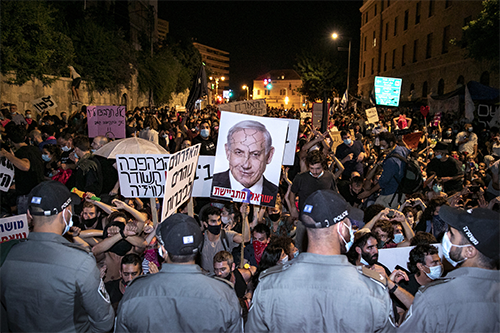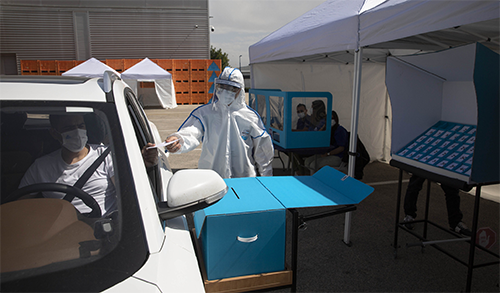
|
How will this election differ from all the others?
Well, now that it’s finally upon us… maybe it won’t.
March 23 will mark Israel’s fourth attempt at breaking a 24-month political stalemate. The final polls predict more of the same -- but as always, small shifts could make a major difference.
Across almost a dozen parties, Israelis remain tightly divided across religious, ethnic and economic divides. Over the past two years, few voters seem to have budged, except for an anti-Netanyahu demographic which appears to lock itself in behind whomever polls indicate is most likely to end the Prime Minister’s 12-year premiership.
At the moment, that’s left-of-center Yair Lapid of the Yesh Atid party. Lapid himself is continuing to be coy about his ambitions, repeatedly saying his top priority isn’t to become Prime Minister but to oust Netanyahu (a disposition which may match the motivations of many of his voters).
On current trends, however, it’s difficult to see how exactly a large enough anti-Netanyahu block could form. For Lapid to become Prime Minister -- at least as part of a rotation agreement with Bennett or Saar -- it would demand both a favorable election result and either defections from Netanyahu’s camp or extremely skilled negotiators who can bring together the left, the right and the majority-Arab parties into a broad, nearly unprecedented coalition. It seems that two parties are not committed to either camp and they might be the wild card -- Bennett’s Yemina and Abbas' Raam.
To help process the initial results and analyze what the intense coalition formation process is going to look like, please join J Street for a post-election webinar with veteran Israeli political journalist Neri Zilber on Wednesday, March 24 at 3pm ET. Click here to register >>
|
|
It’s the vaccination program, stupid
|
|

|
In the final polls published before Tuesday’s vote, Prime Minister Netanyahu appeared to enjoy a late-race boost. If the polls are to be believed, Likud is now on track for roughly 30 seats. Yair Lapid, his top challenger, is polling at roughly 19 seats with his Yesh Atid party.
After enduring a series of tight lockdowns over the past 12 months, pundits are putting the surge in support down to the Netanyahu government’s world-class vaccination rollout. As of now, roughly 60% of Israeli adults have received at least one dose of the vaccination -- one of the fastest public vaccination campaigns in the world.
The drop in positive cases and eased restrictions comes at a perfect moment for Netanyahu, who has made the COVID-19 response a centerpiece of his campaign. His rivals have been trying much the same thing, but with their focus on the 6,000 person death toll and the series of lockdowns Israelis have endured over the past year.
Palestinians, meanwhile, are faced with a desperate situation as COVID-19 continues to spread throughout the occupied territories at an alarming rate, with the distribution of vaccines still highly limited. While international pressure has mounted on Israel to act on its responsibility as the occupying power to ensure Palestinians can be vaccinated, the issue of vaccines for Palestinians is barely featured in the campaign – as is mostly the case with the broader Israeli-Palestinian conflict as a whole.
|
|
Massive anti-Netanyahu protests
|
|

|
Although Prime Minister Netanyahu has much to be happy about when he looks at the latest polling, the same can’t be said when he looks out the window.
Loud, regular anti-Netanyahu protests sparked early on in the pandemic have been a near-constant feature in Jerusalem’s Paris Square, just outside the Prime Minister’s residence. While crowds had dwindled in recent months, this past weekend saw a significant rise in attendance. Over 20,000 protestors from across the political spectrum joined on Saturday, unified by their call for the Prime Minister to resign.
The question of whether the energy of those protests will translate into votes and political power -- a common critique of the loosely organized movement -- remains to be seen. One challenge for the anti-Netanyahu parties will be, in the event of a split Knesset, to prevent right-wing members of their own lists from defecting to support the prime minister during the coalition formation period. Following the last election, Benny Gantz was hamstrung by defections from former Likud MKs who had run on his Blue and White list.
|
|
|
|
It’s an axiom in politics that disunity is death. That may very well be the case for any number of minor parties which have chosen to run separately, rather than on unified ideological tickets. Several are now flirting with electoral oblivion (and wasted votes) if they fall below the 3.25% Knesset entry threshold.
Currently, those parties include the progressive Meretz party, the Arab Raam party, the centrist Blue and White party and the far-right Jewish Home party. The failure of any one of those parties could tip the overall balance of power in a tight seat-count.
|
|
|
|

|
The March 2021 elections may go down as the most expensive and logistically challenging in Israel’s history. Polling stations will be popping up almost everywhere, from Ben Gurion Airport to nursing homes.
Mobile polling stations in buses will be deployed to keep crowding down and many regular polling stations have been duplicated to halve attendance at any particular location. Drones will hover overhead to monitor traffic and detect overcrowding at particular locations.
With so many precautionary measures, election officials are warning that it could take much longer to count ballots than usual. Some observers fear Netanyahu will exploit such delays similarly to President Trump, weaponizing the uncertainty to cast doubts over the legitimacy of the whole process if it results in an unfavorable outcome for him.
|
|

|
J Street is the political home for pro-Israel, pro-peace Americans who want Israel to be secure, democratic and the national home of the Jewish people. Working in American politics and the Jewish community, we advocate policies that advance shared US and Israeli interests as well as Jewish and democratic values, leading to a two-state solution to the Israeli-Palestinian conflict.
This email has been sent to [email protected]. Too much email? Change your subscription settings or unsubscribe here. Email not displaying correctly? View here.
|
|


|